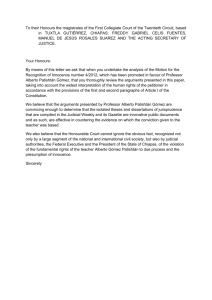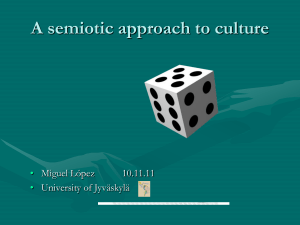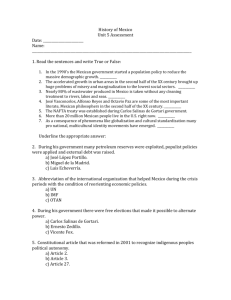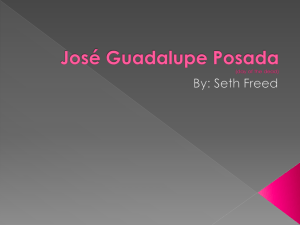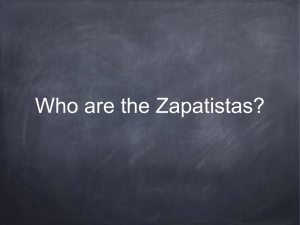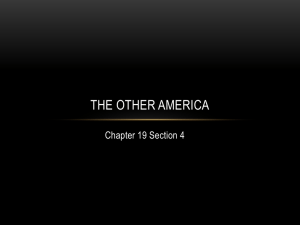Report No. 68/12 - Organization of American States
advertisement
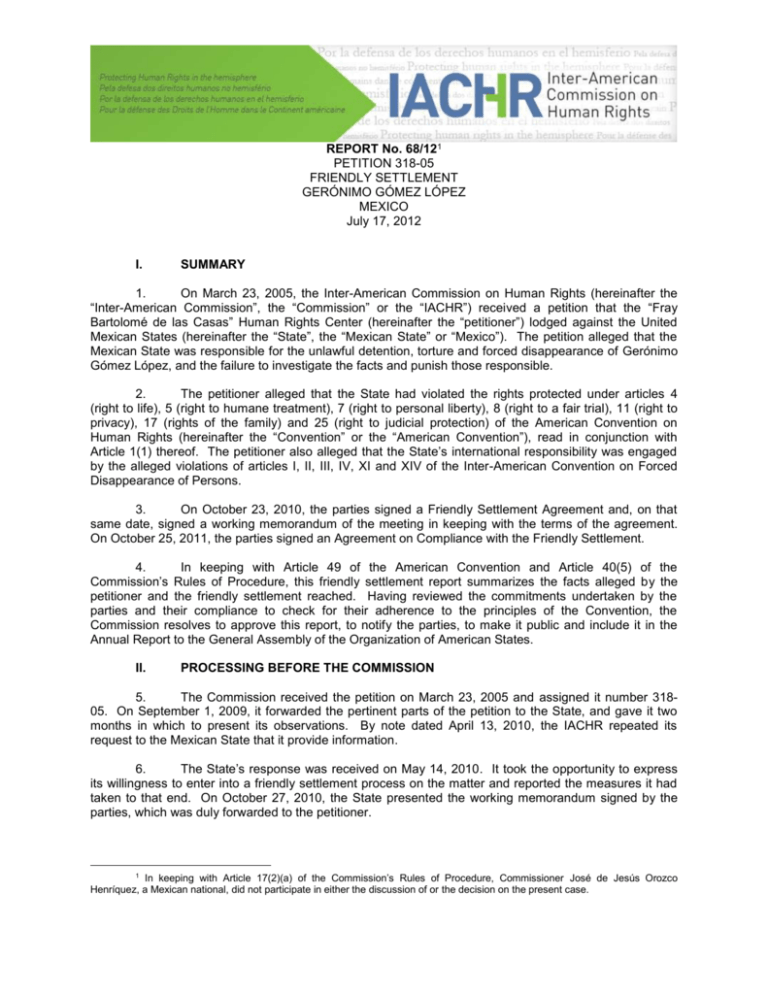
REPORT No. 68/121 PETITION 318-05 FRIENDLY SETTLEMENT GERÓNIMO GÓMEZ LÓPEZ MEXICO July 17, 2012 I. SUMMARY 1. On March 23, 2005, the Inter-American Commission on Human Rights (hereinafter the “Inter-American Commission”, the “Commission” or the “IACHR”) received a petition that the “Fray Bartolomé de las Casas” Human Rights Center (hereinafter the “petitioner”) lodged against the United Mexican States (hereinafter the “State”, the “Mexican State” or “Mexico”). The petition alleged that the Mexican State was responsible for the unlawful detention, torture and forced disappearance of Gerónimo Gómez López, and the failure to investigate the facts and punish those responsible. 2. The petitioner alleged that the State had violated the rights protected under articles 4 (right to life), 5 (right to humane treatment), 7 (right to personal liberty), 8 (right to a fair trial), 11 (right to privacy), 17 (rights of the family) and 25 (right to judicial protection) of the American Convention on Human Rights (hereinafter the “Convention” or the “American Convention”), read in conjunction with Article 1(1) thereof. The petitioner also alleged that the State’s international responsibility was engaged by the alleged violations of articles I, II, III, IV, XI and XIV of the Inter-American Convention on Forced Disappearance of Persons. 3. On October 23, 2010, the parties signed a Friendly Settlement Agreement and, on that same date, signed a working memorandum of the meeting in keeping with the terms of the agreement. On October 25, 2011, the parties signed an Agreement on Compliance with the Friendly Settlement. 4. In keeping with Article 49 of the American Convention and Article 40(5) of Commission’s Rules of Procedure, this friendly settlement report summarizes the facts alleged by petitioner and the friendly settlement reached. Having reviewed the commitments undertaken by parties and their compliance to check for their adherence to the principles of the Convention, Commission resolves to approve this report, to notify the parties, to make it public and include it in Annual Report to the General Assembly of the Organization of American States. II. the the the the the PROCESSING BEFORE THE COMMISSION 5. The Commission received the petition on March 23, 2005 and assigned it number 31805. On September 1, 2009, it forwarded the pertinent parts of the petition to the State, and gave it two months in which to present its observations. By note dated April 13, 2010, the IACHR repeated its request to the Mexican State that it provide information. 6. The State’s response was received on May 14, 2010. It took the opportunity to express its willingness to enter into a friendly settlement process on the matter and reported the measures it had taken to that end. On October 27, 2010, the State presented the working memorandum signed by the parties, which was duly forwarded to the petitioner. 1 In keeping with Article 17(2)(a) of the Commission’s Rules of Procedure, Commissioner José de Jesús Orozco Henríquez, a Mexican national, did not participate in either the discussion of or the decision on the present case. 2 7. The Commission also received information from the State on April 1, 2011 and November 11, 2011. Those communications were also promptly sent to the petitioner. III. THE FACTS 8. The petitioner alleged that Gerónimo Gómez López, a Tsotsil indigenous man, was unlawfully detained and tortured for three days by police of the Municipality of Simojovel. The petitioner also alleged that while confined in the municipal jail, Mr. Gómez López was not allowed to communicate with his family members and was never brought before a competent judicial authority at any time during his detention. The petitioner also asserted that Gerónimo Gómez López had allegedly disappeared while in the custody of State agents, under circumstances that to this date have never been explained. It added that these events were never investigated by the State and those responsible were never punished. 9. Specifically, the petitioner stated that on December 20, 2000, Gerónimo Gómez was detained by members of the Simojovel Municipal Police Force. It reported that the following day, police agents had allegedly taken him to his home in custody and had reportedly searched the premises, without an order issued by a competent court authority. It stated that his wife, Ofelia Díaz Pérez, was at home at the time and was able to discern that Gerónimo had been “badly beaten, was half dressed and in handcuffs.” When the search was completed, the police took Gerónimo back to the Simojovel municipal jail. 10. According to the petitioner, on December 21, 22 and 23, 2000, Ofelia Díaz went to the facilities of the Municipal Police Force to locate her husband. The petitioner reported that police agents had allegedly given no answer as to the reason why he was taken into custody and had refused to allow her access to his cell or any other contact with him. It added that on the morning of December 23, Ofelia had managed to communicate with her husband by shouting from the street; he had allegedly told her that he was badly beaten and asked her to leave, because if she didn’t the beatings would continue. 11. The petitioner stated that on the afternoon of December 23, Ofelia returned to the municipal jail, where she saw her husband as he was being put in a police patrol car. As a guard at the jail told her some hours later, Gerónimo Gómez López had allegedly been transferred to the city of Tuxtla Gutiérrez, capital of Chiapas State, to turn him over to the Federal Public Prosecutor’s Office. The petitioner stated that having learned this, on December 24 Ofelia and her brother-in-law Higinio Gómez López, set out for the Cerro Hueco Prison located in Tuxtla Gutiérrez; they also went to the Office of the Public Prosecutor for the Municipality of Bochil. However, they were unable to get any information on her husband’s whereabouts. 12. The petitioner observed that unable to locate her husband, Ofelia and her brother-in-law went to the Director of the Simojovel Police Force, who told them that as Mr. Gómez López was being transferred to Tuxtla Gutiérrez, they were allegedly intercepted by some fifteen to twenty armed persons wearing hoods, who had taken him away. According to the petitioner, the municipal authorities never substantiated this information. 13. The petitioner reported that as a result of these events, on December 27, 2000 Ofelia Díaz and Higinio Gómez filed a criminal complaint. The petitioner alleged that the Public Prosecutor’s Office had initially believed that an administrative report documenting the complaint would suffice; on January 2, 2001, that report was handed over for a preliminary inquiry, classified as number 002/28/2001. The petitioner added that the preliminary inquiry was never a serious, diligent and effective investigation, as no steps were taken to shed light on the facts and ascertain the truth. The petitioner further alleged that a medical certificate attesting to the wounds and other injuries sustained by Gerónimo and a police report prepared by the Director of the Simojovel Police Force for the Simojovel Municipal President had been removed from the criminal case file, as they would have been very compromising for the municipal authorities. 3 14. The petitioner also wrote that a petition of amparo was filed with the Chiapas State Fifth District Judge concerning Gerónimo’s disappearance, and was registered as number 1025/2003. The petitioner stated that under Mexico’s domestic legal system, amparo is the appropriate remedy in a case of forced disappearance. The Amparo Law provides that this remedy applies in the event of any act that might compromise one’s personal liberty. The petitioner pointed out, however, that in order to be admissible, the petition of amparo must be ratified by the affected person, which in a case of forced disappearance would be impossible. The petitioner stated that for that reason, on September 24, 2004, the judge in question had allegedly issued his ruling to the effect that no petition of amparo had been filed. The petitioner contends that to this day, the whereabouts of Gerónimo Gómez are still unknown. IV. 15. as follows: FRIENDLY SETTLEMENT On October 23, 2010, the parties agreed on the “Summary of Agreements,” which reads At 1:00 p.m. on October 23, 2010, in the city of San Cristóbal de Las Casas, Chiapas, the following gathered at the "Fray Bartolomé de las Casas" Human Rights Center, A.C., to address and followup on the proposed Friendly Settlement Agreement in connection with petition P-318-05 – Gerónimo Gómez López- now pending at the Inter-American Commission on Human Rights (hereinafter the IACHR): for the Mexican State, Lic. Pedro Raúl López Hernández, Special Prosecutor for the Protection of Nongovernmental Organizations for the Defense of Human Rights, and Lic. Francisco Girón López, Special Prosecutor in Human Rights, Treatment of Victims and Community Services, both attached to the Office of the State’s Attorney General; as representatives of the petitioner, Lic. Diego Cadenas Gordillo and Lic Rubén Moreno Méndez, Director and member of the “Fray Bartolomé de las Casas” Human Rights Center, A.C. (Representatives); and Mrs. Ofelia Díaz Pérez as petitioner. The background and agreements reached are as follows: BACKGROUND: On March 22, 2005, the “Fray Bartolomé de las Casas” Human Rights Center, A.C., filed Petition P-318-05 with the IACHR in the city of Washington, D.C., on behalf of and as representative for Mrs. Ofelia Díaz Pérez. In that petition they blamed the Mexican State for the detention, torture and forced disappearance of Mr. Gerónimo Gómez López, and requested that the Mexican State be held responsible for violations of the right to life, the right to personal liberty, the right to humane treatment and personal security, the right to judicial guarantees, the right to judicial protection, the right to the truth, the right to have one’s honor respected and one’s dignity recognized, and the right to protection of the family. On September 17, 2009, the Secretariat of Foreign Relations advised the Chiapas State Government that the IACHR had sent the Mexican State a communication forwarding the pertinent parts of the initial brief filed by the “Fray Bartolomé de las Casas” Human Rights Center, A.C., in connection with Petition P-318-05, Gerónimo Gómez López. These developments can be traced to the following: on December 27, 2000, the Public Prosecutor’s Office issued Administrative Report No. 044/AMP/2000, based on a complaint filed by C. Higinio Gómez López for the possible commission of criminal acts (a person’s disappearance) against his brother Gerónimo Gómez López. The events occurred in the municipality of Simojovel de Allende, State of Chiapas; as a result of the proceedings conducted, on January 2, 2001 a decision was made to elevate the matter to the rank of a preliminary inquiry, classification number 0002/AMPI/2001. To address the present case, the Mexican State, through the Government of the State of Chiapas, established contact with the petitioners to explore alternative solutions and settle the case that the petitioners lodged with the IACHR. It came up with a proposal for resolving this matter by arriving at a friendly settlement agreement with the petitioners. Working from the government’s proposal, there were a number of meetings and exchanges with the petitioners. Various suggestions and observations were made on how to follow up on the 4 Proposed Friendly Settlement Agreement for Petition P-318-05 – Gerónimo Gómez López, now pending before the IACHR. This Memorandum is signed on this date to document the following: AGREEMENTS: 1.- The Pursuit of Justice: A.- The Mexican State, acting through the State Executive, shall appoint a prosecutor devoted exclusively to investigating and putting together the preliminary inquiry instituted into the forced disappearance of Mr Gerónimo Gómez López; the prosecutor will be equipped with a support team and sufficient material resources, and will be attached to the Office of the Special Prosecutor for the Protection of Nongovernmental Organizations for the Defense of Human Rights (FEPONGDDH). Operating by the principles of legality, objectivity, certainty and efficiency, the prosecutor will undertake an investigation into the facts. Once the nature of the offense has been verified and the necessary legal evidence has been gathered, he will make a determination –in strict accordance with the law and with full respect for human rights- and prosecute the person or persons responsible. B.- The Mexican State, through the Executive of the State of Chiapas, hereby pledges to keep Mrs. Ofelia Díaz Pérez constantly informed of the status of the case and of the evidence compiled in the inquiry. This reporting shall be done in writing and by way of her accredited representatives. She shall be advised of each and every piece of evidence gathered and examined, to show the evidence put together in connection with the investigation, the timetable of activities being conducted to that end, and to ensure that it coincides with the time period allowed to complete the present investigation, which shall be no longer than one (1) year from the date on which the Friendly Settlement Agreement is signed. 2.- Reparations: I.- Pecuniary damages: A) Lucrum cessans: The Government of the State shall pay Mrs. Ofelia Díaz Pérez the sum of $180,000 (one hundred eighty thousand Mexican pesos) as LUCRUM CESSANS, irrespective of the outcome of the investigation, as the prosecution of the case is still ongoing and it would be inappropriate to determine at this point just how far the investigation will reach. B) Damnum emergens: The state executive undertakes to treat Mrs. Ofelia Díaz Pérez in a dignified and respectful manner, and to grant her a lifetime monthly pension. Accordingly, the head of the State Government shall send the Chiapas State Congress a proposal for a decree, to be published in the State’s Official Newspaper, under which she is paid monthly financial assistance in the form of a lifetime pension for the sum of $10,000.00 (ten thousand Mexican pesos per month). This is a personal pension that cannot be declared forfeit, attached or assigned. Non-pecuniary damages: II.- Moral damages: Likewise, the Mexican State, through the Government of the State of Chiapas, shall provide the sum of $150,000.00 (one hundred fifty thousand Mexican pesos) for the purchase of a property in the name of Mr. Gerónimo Gómez López’ children –Antonio, Ana Erika and Carlos Jerónimo- all minors. The amount in question was determined by factoring in the maximum authorized amount under the housing programs that the State Government now offers for the rural area and shall be pledged in the notarized deed made out in the name of the children of C. Ofelia Díaz Pérez. This pledge is made irrespective of the outcome of the investigation, as the prosecution of the case is still ongoing and it would be inappropriate to determine at this point just how far the investigation will reach. C) Other Forms of Support: The Mexican State pledges to provide the following to Mrs. Ofelia Díaz Pérez and to Mr. Gerónimo Gómez López’ three minor children - Antonio, Ana Erika and Carlos Jerónimo: i. ii. Medical and psychological care. Medical and psychological care shall be provided free of charge by enrolling them in a medical insurance plan in the Chiapas public health institutions. Educational assistance up to the university level. Antonio, Ana Erika and Carlos Jerónimo, the children of Mr. Gerónimo Gómez López, will be given scholarships for their studies. 5 3.- Measures of Satisfaction and Non-Repetition: Under this heading, and at the petitioners’ request, the Mexican State, in the person of the Chiapas State Executive, will stage a public ceremony –preferably in the municipal seat of Simojovel, Chiapas- as a measure to ensure that events like this do not recur; at the ceremony, public apologies shall be made in which the state acknowledges responsibility for the lack of a conclusive investigation, the negligence on the part of the authorities in charge of the investigation, and the violations of due process which allowed the guilty to go unpunished, denied the victims justice and truth, and resulted in violations of the human rights of the victim’s next of kin. The State must ensure that at least three media outlets with national coverage and at least three with state coverage are present for the ceremony. Furthermore, news of the ceremony is to be reported in the Official Newspaper of the State of Chiapas, in three consecutive issues. In addition to the wide coverage that this public apology ceremony will receive in the media, there shall be guarantees that the ceremony will be widely covered and disseminated throughout the entire Radio and Television System run by the Government of Chiapas State. In addition, the Government of the State of Chiapas shall institute the necessary administrative and/or criminal proceedings against any present and/or former public servants suspected of bearing any responsibility in this matter. Once all the evidence has been examined and the necessary measures taken, if the results of the investigation show that Mr. Gerónimo Gómez López was the victim of a forced disappearance, the Mexican State shall be ready to issue a finding and, if necessary, publicly acknowledge its own blame. As a measure to ensure that events like this do not recur, the Mexican State pledges to name some public work in Gerónimo Gómez López’ memory. The choice shall be by mutual agreement with the petitioners and shall feature a summary of what happened and a reference to the State’s responsibility for the human rights violations thereby committed. 4.- Adoption of legislative measures to prevent and punish forced disappearance: Inasmuch as this crime is condemned as a denial of the objectives of the United Nations Charter and a serious and manifest violation of human rights and fundamental freedoms, at his own initiative the Chiapas state executive sent a bill to the local legislature on September 11, 2009, to enact a law to prevent forced disappearance and punish the authors and accomplices of this crime and anyone who aids and abets them in any way; the law will also establish the measures for full reparations for the victims. It is called the Law to Prevent and Punish Forced Disappearance of Persons in the State of Chiapas, and was approved through Decree No. 319, published in the State’s Official Newspaper, Issue No. 189, Section Two, dated September 23, 2009. The parties agree that this Friendly Settlement Agreement shall be submitted to the IACHR for ratification. They also agree that once each and every point in this memorandum regarding Petition P-318-05 is carried out, the IACHR shall be so informed, so that the case may be closed if it meets with the petitioners’ satisfaction. 16. On October 23, 2010, the parties signed a “Working memorandum on follow-up and fulfillment of the friendly settlement proposal between the Mexican State and the petitioners with respect to Petition-318-05, Gerónimo Gómez López, which is pending with the Inter-American Commission on Human Rights”. It reads as follows: In the city of San Cristóbal de las Casas, Chiapas, at 1:00 p.m. on October 23, 2010, the following persons gathered in the offices of the “Fray Bartolomé de las Casas” Human Rights Center, A.C.: for the Mexican State, Lic. Pedro Raúl López Hernández, Special Prosecutor for the Protection of Nongovernmental Organizations for the Defense of Human Rights, and Lic. Francisco Girón López, Special Prosecutor in Human Rights, Treatment of Victims and Community Services, both attached to the Office of the State’s Attorney General; for the representatives and beneficiaries, Lic. Diego Cadenas Gordillo and Lic Rubén Moreno Méndiz, Director and member of the “Fray Bartolomé de las Casas” Human Rights Center, A.C., and Mrs. Ofelia Díaz Pérez. The meeting was held for the purpose of addressing and complying with the agreements reached in the Friendly Settlement of this same date, October 23, 2010. BACKGROUND (…) REPARATIONS: 6 Because the prosecution of this case is still in progress, it would be inappropriate to determine just how far the investigation will reach. Nevertheless, the Mexican State, without prejudicing the investigation’s outcome, is making reparations for damages under the following headings: Pecuniary damages As reparations for the pecuniary damages, on this date the Government of the State of Chiapas is paying compensation to Mrs. Ofelia Díaz Pérez, the beneficiary in Petition P-318-05, Gerónimo Gómez López, in the amount of $180,000.00 (one hundred eighty thousand Mexican pesos), as reparations for the damages under the heading of lucrum cessans.. Non-pecuniary damages Under this heading, Mrs. Ofelia Díaz Pérez is receiving from the Government of the State of Chiapas the sum of $150,000.00 (one hundred fifty thousand Mexican pesos), which shall be used to purchase a property in the name of Gerónimo Gómez López’ minor children –Antonio, Ana Erika, and Carlos Jerónimo. That figure was arrived at on the basis of the maximum amount authorized under the housing programs that the state government currently offers for the rural area. It being 3:00 p.m., the present working memorandum is closed. At the bottom it bears the signatures of those who participated. Done and signed in the city of San Cristóbal de las Casas, Chiapas, Mexico. 17. On October 25, 2011, the parties signed an “Agreement on Compliance with Friendly Settlement P-318-05,” which reads as follows: At Calle veinte de noviembre sur, number 5, in the city of Simojovel de Allende, Chiapas State, on the 25th day of the month of October in the year 2011, the following persons were present: representing the Government of Chiapas, Lic. ADRIANA REBOLLO NUNCAMENDI, Special Prosecutor for the Protection of Nongovernmental Organizations for the Defense of Human Rights, Office of the State’s Attorney General, and Lic. Francisco Girón López, Special Prosecutor in Human Rights, Treatment of Victims and Community Services, both attached to the Office of the State’s Attorney General, and Mrs. OFELIA DÍAZ PÉREZ, common law wife and beneficiary of Gerónimo Gómez López. Those present were there for the purpose of addressing and reporting on the actions that the State Government has taken with respect to each one of the agreements that the two parties signed on October 23, 2010, in the city of San Cristóbal de Las Casas, Chiapas. Accordingly, reference should make to the following: BACKGROUND (…) AGREEMENTS (…) ACTIONS TAKEN TO COMPLY WITH THE AGREEMENTS To provide legal support to the friendly settlement agreements, Decree No. 164 of March 2, 2011, was published in the Chiapas State Government’s Official Newspaper, Issue No. 285, Section Two, whereby the State’s Chief Executive is authorized to comply with the Friendly Settlement Agreement. ONE.- Under the heading of pursuit of justice, the PGJE [Office of the Chiapas State Attorney General] reports that it conducted the investigations that the case warranted, using special prosecutorial personnel for the purpose. Inquiries 174/28/2000 and 02/28/2001 were completed, recorded and then joined. On August 31, 2011, the Prosecutor from the Public Prosecutor’s Office brought criminal proceedings against Rodolberto Santos Ramos, David Roguel Figeroa, Víctor Pérez Gómez, Rodolfo Pérez Ruiz, Andrés Sánchez Gutiérrez and Guadalupe Rodríguez Hernández, as the likely parties responsible for the crime of Forced Disappearance, committed against the disappeared Gerónimo Gómez López. As a result, on September 12 of this year, the first criminal judge of the Tuxtla judicial district issued the corresponding arrest warrant for the persons named above, for the crime of forced disappearance. On September 22 and 23, 2011, respectively, RODOLBERTO SANTOS RAMOS and RODOLFO PÉREZ RUIZ were brought before the First Criminal Judge of that Judicial District, with its seat in Cintalapa de Figueroa, Chiapas. They were confined in the “El Amante” Convict Social Rehabilitation Center No. 14, accused of the crime of forced disappearance committed against 7 Gerónimo Gómez López. The forced disappearance and surrounding events occurred in the municipality of Simojovel de Allende, Chiapas State. Arrest warrant 166/2011 was thus partially carried out; other persons named in the arrest warrant are still at large. TWO.- As for reparations, the PGJE reports that on September 20 of this year, official papers were drawn up documenting the financial assistance provided to Mrs. Ofelia Díaz Pérez, common-law spouse of Mr. Gerónimo Gómez López on October 23, 2010. The itemization is as follows: The sum of $180,000.00 (one hundred eighty thousand Mexican pesos) as lucrum cessans. The sum of $ 150,000.00 (one hundred fifty thousand Mexican pesos) as moral damages, to be used to purchase a property that will be in the name of minors Luis Antonio, Ana Erika and Carlos Gerónimo, surname Gómez Díaz, all children of Mr. Gerónimo Gómez López. The figure for this financial support was based in part on the maximum amount authorized under the housing programs that the State Government currently offers for the rural area; the notarized deed is to be drawn up by this entity and shall be in the name of the aforementioned minors, as stipulated in the Friendly Settlement Agreement. The sum of $60,000 (sixty thousand Mexican pesos), representing a portion of the lifetime pension from the months of March to August 2011. All these amounts were handed over in the presence of public servants with the State Government. THREE – FELLOWSHIPS: The sum of $5,380 (five thousand three hundred eighty Mexican pesos) was given for the minors Luis Antonio, Ana Erika and Carlos Gerónimo, surname Gómez Díaz, the children of Mr. Gerónimo Gómez López, for fellowships; the amount in question is for the months of March to September 2011. FOUR.- On September 29 of this year, Lic. Juan Sabines Guerrero, Constitutional Governor of the State of Chiapas, read the document on the Public Acknowledgment of State Responsibility. FIVE.- The PGJE reports at this meeting that it has taken all the measures necessary to comply with the agreements that the State Government undertook and will continue to carry out the outstanding arrest warrants. SIX. – Mrs. Ofelia Díaz Pérez states that she has a command of the Spanish language and the tzotzil dialect and therefore fully comprehends what has been reported; she is in agreement and is satisfied with the results of the claims she made to the IACHR. She has no objection to the State presenting this agreement to the IACHR to show that it has complied with the friendly settlement agreement. SEVEN.- The signers of this document and those who understand the legal value and consequences of its content have read this document, expressed their agreement with it, ratify and sign it on the very day of its issuance. V. DETERMINATION OF COMPATIBILITY AND COMPLIANCE 18. The IACHR reiterates that under Articles 48(1)(f) and 49 of the Convention, the purpose of this procedure is that of "reaching a friendly settlement of the matter on the basis of respect for the human rights recognized in this Convention." The State's consent to pursue this avenue is evidence of its good faith to honor the Convention's purposes and objectives, based on the principle of pacta sunt servanda, by which States must act in good faith to carry out the obligations they assume in treaties. The Commission also wishes to reiterate that the friendly settlement procedure provided for in the Convention makes it possible to conclude individual cases in a non-contentious manner and has proven, in cases related to various countries, to offer an important and effective vehicle for settlement that can be used by both parties. 19. The Inter-American Commission has closely followed the development of the friendly settlement reached in the present case and very much appreciates the efforts made by both parties to arrive at a solution that serves the object and purpose of the Convention. 8 20. With regard to compliance with the points in the agreement, from the information supplied by the parties the IACHR observes the following: 1. Appoint a prosecutor devoted exclusively to investigating and putting together the preliminary inquiry instituted into the forced disappearance of Mr. Gerónimo Gómez López. The State reported that, by memorandum No. FEPONGDDHH/0036/2011, dated January 25, 2011, the Special Prosecutor for the Protection of Nongovernmental Organizations for the Defense of Human Rights assigned a prosecutor to work full-time investigating preliminary inquiries 174/28/2000 and 02/28/2001, which concern the forced disappearance of Gerónimo Gómez López. The State also reported that on September 7, 2011, the designated prosecutor brought criminal charges against six persons suspected in the forced disappearance, before the First Criminal Judge of the Tuxtla Judicial District. It also pointed out that on September 12, 2011, the judge issued arrest warrants for the accused. Two of those warrants were executed on September 22 and 23, 2011. 2. Keep Mrs. Ofelia Díaz Pérez constantly informed of the status of the case and of the evidence compiled in the inquiry. This reporting shall be done in writing and by way of her accredited representatives. The State reported that on February 9 and 24, 2011, the Office of the State’s Attorney General (PGJE) informed the petitioner of the progress made in the investigation. 3. Pay the sum of $180,000 (one hundred eighty thousand Mexican pesos), as lucrum cessans. The State made good on this commitment on October 23, 2010. 4. As damnum emergens, pay Mrs. Ofelia Díaz Pérez a lifetime pension for the sum of $10,000.00 (ten thousand Mexican pesos) per month. On March 2, 2011, the Official Chiapas State Newspaper, Issue No. 285-2, carried Decree No. 164 “Whereby the State’s Chief Executive is authorized to comply with the Friendly Settlement Agreement signed in case P-318-05, Gerónimo Gómez López, pending with the Inter-American Commission on Human Rights.” Article 2 of the decree authorizes the State’s Chief Executive to pay the lifetime pension. 2 The State reported that the lifetime pension is in fact being paid, since the date on which the agreement was signed. 5. Pay the sum of $150,000.00 (one hundred fifty thousand Mexican pesos) as non-pecuniary damages. The State fulfilled this commitment on October 23, 2010. 6. Free medical and psychological care through enrollment in a medical insurance plan with the State’s public health institutions. The State reported that the Chiapas State Government Health Institute enrolled Mrs. Ofelia Díaz Pérez and her three children in the Seguro Popular. 7. Educational assistance in the form of scholarships for Mr. Gerónimo Gómez López’ three children. The State reported that under Article 4 of Decree No. 164, authorization was given to make the payment in question. 3 It Article 2 of Decree No. 164 provides that: “The State’s Chief Executive is hereby authorized to grant Mrs. Ofelia Díaz Pérez a pension of $10,000.00 (ten thousand Mexican pesos), paid monthly and for life. The money shall be paid out on the last working day of each month and is paid as damnum emergens”. Later, through Decree No. 296, published on August 11, 2011, in the official newspaper, issue No. 321, the Secretariat of Development and Social Participation of the State was instructed to make the necessary arrangements to have the monthly payments made. 3 The pertinent part of Article 4 of Decree No. 164 reads as follows: “(…) [T]he afore-named minors shall receive their educational services free of charge by awarding them scholarships to pursue their studies up to the level of higher education.” 2 9 also reported that the sum of $5,380.00 (five thousand three hundred eighty Mexican pesos) was provided, which is for the months of March to September 2011. 8. A public ceremony for acknowledgment of responsibility in the failure to investigate and violations of due process. 4 On September 29, 2011, in the presence of Mrs. Ofelia Díaz Pérez, her representatives and members of the media, the Governor of Chiapas State read the document in which the State acknowledged its responsibility.5 9. Institute the necessary administrative and/or criminal proceedings against any present and/or former public servants suspected of bearing any responsibility in this matter; if the forced disappearance is proved, a public acknowledgement of responsibility. The State reported that the prosecutor in charge of the investigation of the facts did a “breakdown of proceedings for the Office of the Special Prosecutor for Crimes Committed in the Pursuit of Justice in the State and Those Committed in Acteal, to determine whether any irregularities were committed in the preliminary inquiry by public servants with the Northern District Prosecutor’s Office in Pichucalco, Chiapas.” 10. Adoption of legislative measures to prevent and punish forced disappearance. The Law for the Prevention and Punishment of Forced Disappearance of Persons in the State of Chiapas was approved through Decree No. 319, published in the State’s official newspaper, issue No. 189, section two, dated September 23, 2009. 21. The IACHR also observes that both Mexico and the petitioners acknowledged compliance with the commitments undertaken by the State in the “Agreement on Compliance with the Friendly Settlement P-319-05,” dated October 25, 2011, which reads in part as follows: “Mrs. Ofelia Díaz Pérez states that she has a command of the Spanish language and the tzotzil dialect and therefore fully comprehends what has been reported; she is in agreement and is satisfied with the results of the claims she made to the IACHR. She has no objection to the State presenting this agreement to the IACHR to show that it has compliance with the friendly settlement agreement.” 22. The Commission reiterates that it appreciates the considerable efforts made by the State of Mexico to honor the commitments made in the agreement the parties signed on October 23, 2010. VI. CONCLUSIONS 23. Based on the foregoing considerations and by virtue of the procedures established in Articles 48(1)(f) and 49 of the American Convention, the Commission would like to reiterate its deep appreciation for the efforts carried out by the parties and its satisfaction over the achievement of the friendly settlement agreement in this case, one that serves the object and purpose of the American Convention. 4 Under the measures of satisfaction and non-repetition, the parties agreed that “if once all the evidence has been examined and the necessary measures taken it is found that Mr. Gerónimo Gómez López was the victim of a forced disappearance, the Mexican State shall issue the finding and, as appropriate, publicly acknowledge its responsibility. As a measure to ensure that events like this do not recur, the Mexican State pledges to name some public work in Gerónimo Gómez López’ memory. The choice shall be by mutual agreement with the petitioners and shall feature a summary of what happened and a reference to the State’s responsibility for the human rights violations thereby committed.” 5 Milenio, Ofrecen perdón público a los familiares de desaparecido, October 1, 2011; Crónica, Pide JSG perdón público a familiares de desaparecido por más de una década, October 1, 2011; El Heraldo de Chiapas, Sabines pide perdón público por caso de desaparecido hace una década, October 1, 2011; La Voz del Sureste, Gobernador pide perdón público a familia de desaparecido por más de diez años, September 30, 2011. 10 24. Based on the considerations and conclusions set forth in this report, 11 THE INTER-AMERICAN COMMISSION ON HUMAN RIGHTS DECIDES: 1. To approve the terms of the agreements that the parties signed on October 23, 2010 and October 25, 2011. 2. Assembly. To make the present report public and include it in its Annual Report to the OAS General Done and signed in the city of Washington, D.C., on the 17th day of the month of July 2012. (Signed): Tracy Robinson, First Vice-President; Dinah Shelton, Rodrigo Escobar Gil, Rosa Maria Ortiz, and Rose-Marie Belle Antoine, Commissioners.
